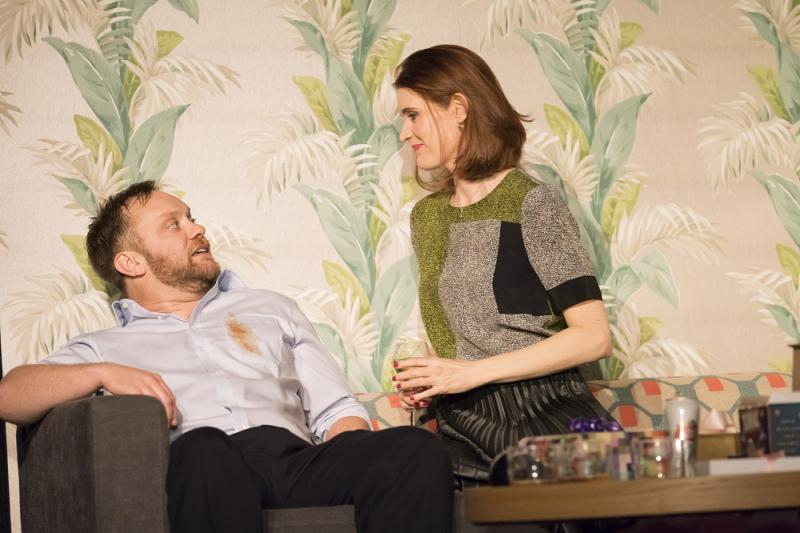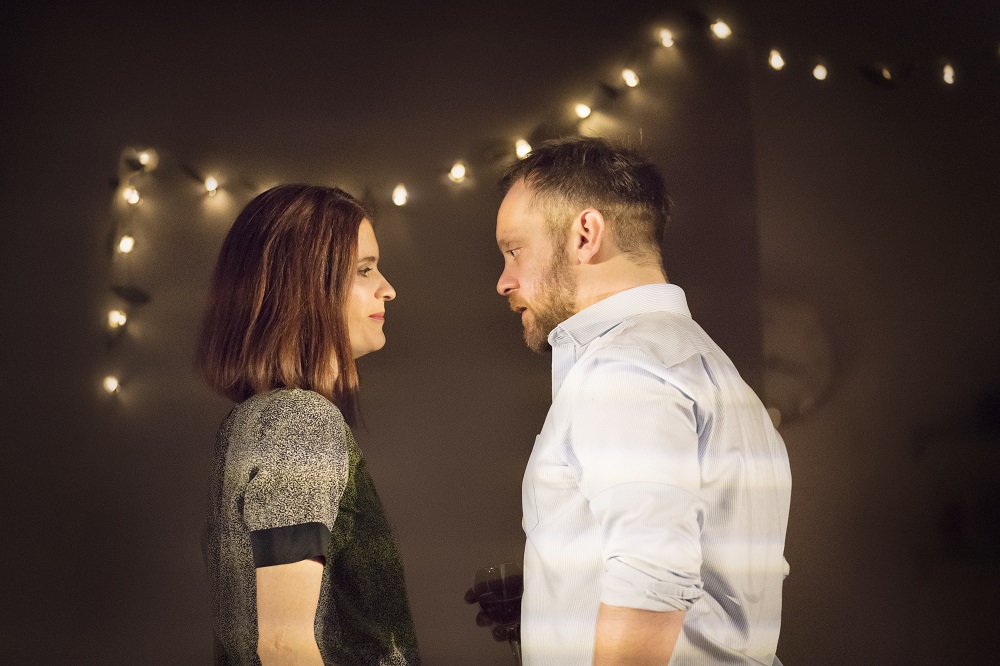Beginning, National Theatre review - assured, intimate, but short of surprises | reviews, news & interviews
Beginning, National Theatre review - assured, intimate, but short of surprises
Beginning, National Theatre review - assured, intimate, but short of surprises
David Eldridge's wry-warm two-hander on the unsexy side of singledom

Loneliness: in the age of the digital hook-up and the flaunting narcissism of social media, it’s become a strange sort of taboo – a secret shame, the unsexy side of singledom. So it’s good to see playwright David Eldridge putting it centre-stage in this tender, pleasingly unsentimental two-hander.
It’s 2015 – pre-Trump, pre-Brexit referendum – and we’re in the North London bijou urban village of Crouch End, a setting of rom-comish boho charm, where new resident Laura (Justine Mitchell) is throwing a house-warming party. The last guests have staggered out into the night or poured each other into minicabs – all except Danny (Sam Troughton), who lingers awkwardly in the half-formed hope of making good on the flirtation that’s been flickering between himself and his hostess all evening. Among the paint samples, unhung pictures and festive debris (designed with tatty authenticity by Fly Davis), they crack open another bottle, and Laura makes it clear she’s keen.
Yet rather than simply tearing each other’s clothes off, they begin a stumbling dance of wisecracks and confidences, of confessions and defensive feints, of fierce longing and crippling fear. As they both keep pointing out, they don’t know each other at all. When they do – if they ever do – how will it alter the way they feel? Is this the beginning of something life-changing, or just a regrettable one-night stand? Eldridge’s play is most engaging when it subverts expectation. Laura and Danny are not a couple of tentative, photogenic millennials – they’re flawed, middle-aged and experience-scarred. And though Danny looks at first glance like the swaggering, skirt-chasing Essex boy he probably habitually pretends to be, it is he who holds back, fearful of disappointing her and hurting himself, while Laura, Irish by birth and a lifelong Londoner, is poised and sexually forthright. The toe-curling banter and the hunger for connection that it fails to hide are winningly handled.
Eldridge’s play is most engaging when it subverts expectation. Laura and Danny are not a couple of tentative, photogenic millennials – they’re flawed, middle-aged and experience-scarred. And though Danny looks at first glance like the swaggering, skirt-chasing Essex boy he probably habitually pretends to be, it is he who holds back, fearful of disappointing her and hurting himself, while Laura, Irish by birth and a lifelong Londoner, is poised and sexually forthright. The toe-curling banter and the hunger for connection that it fails to hide are winningly handled.
But while Danny is drawn with real texture, Laura is, despite Mitchell’s superb performance, a much thinner creation. As dawn approaches and booze is consumed, Danny reveals his vulnerabilities: still wounded by the loss of his dad, he has a dead-end job, a claustrophobic homelife with his mum and nan, and an ex-wife and a daughter whom, agonisingly, he never sees. Laura has unhappy family history, too; but there’s a whiff of cliché about her – the high-powered career woman who has plenty of money, but a life she describes as “a shell”. It’s a thumping disappointment when it turns out that what she really wants to fill that void is a baby – a hoary and reductive account of femininity that the play does too little to counter or question. And the moral issues behind her intentions – she won’t guarantee that she would allow Danny’s involvement in the child’s life if their relationship doesn’t work out – hang in the air, unresolved and under-explored.
For all that, though, there’s much here to touch and charm. As Danny and Laura’s conversation meanders, we repeatedly catch glimpses of everything that might bind them together and push them apart, from politics to their shared passion for Scotch eggs. And there’s a delicious sequence of appalling dance moves that segues elegantly into an unspoken and unintentionally cruel rejection. The play’s pleasures are quiet, ordinary, even a little unambitious. But anyone who has a heart will find in it something familiar, piercing and rueful, and – buried beneath the fumbling and stumbling, the ache and anxiety – little stabs of joy.
rating
Explore topics
Share this article
The future of Arts Journalism
You can stop theartsdesk.com closing!
We urgently need financing to survive. Our fundraising drive has thus far raised £49,000 but we need to reach £100,000 or we will be forced to close. Please contribute here: https://gofund.me/c3f6033d
And if you can forward this information to anyone who might assist, we’d be grateful.

Subscribe to theartsdesk.com
Thank you for continuing to read our work on theartsdesk.com. For unlimited access to every article in its entirety, including our archive of more than 15,000 pieces, we're asking for £5 per month or £40 per year. We feel it's a very good deal, and hope you do too.
To take a subscription now simply click here.
And if you're looking for that extra gift for a friend or family member, why not treat them to a theartsdesk.com gift subscription?
more Theatre
 The Assembled Parties, Hampstead review - a rarity, a well-made play delivered straight
Witty but poignant tribute to the strength of family ties as all around disintegrates
The Assembled Parties, Hampstead review - a rarity, a well-made play delivered straight
Witty but poignant tribute to the strength of family ties as all around disintegrates
 Mary Page Marlowe, Old Vic review - a starry portrait of a splintered life
Tracy Letts's Off Broadway play makes a shimmeringly powerful London debut
Mary Page Marlowe, Old Vic review - a starry portrait of a splintered life
Tracy Letts's Off Broadway play makes a shimmeringly powerful London debut
 Little Brother, Soho Theatre review - light, bright but emotionally true
This Verity Bargate Award-winning dramedy is entertaining as well as thought provoking
Little Brother, Soho Theatre review - light, bright but emotionally true
This Verity Bargate Award-winning dramedy is entertaining as well as thought provoking
 The Unbelievers, Royal Court Theatre - grimly compelling, powerfully performed
Nick Payne's new play is amongst his best
The Unbelievers, Royal Court Theatre - grimly compelling, powerfully performed
Nick Payne's new play is amongst his best
 The Maids, Donmar Warehouse review - vibrant cast lost in a spectacular-looking fever dream
Kip Williams revises Genet, with little gained in the update except eye-popping visuals
The Maids, Donmar Warehouse review - vibrant cast lost in a spectacular-looking fever dream
Kip Williams revises Genet, with little gained in the update except eye-popping visuals
 Ragdoll, Jermyn Street Theatre review - compelling and emotionally truthful
Katherine Moar returns with a Patty Hearst-inspired follow up to her debut hit 'Farm Hall'
Ragdoll, Jermyn Street Theatre review - compelling and emotionally truthful
Katherine Moar returns with a Patty Hearst-inspired follow up to her debut hit 'Farm Hall'
 Troilus and Cressida, Globe Theatre review - a 'problem play' with added problems
Raucous and carnivalesque, but also ugly and incomprehensible
Troilus and Cressida, Globe Theatre review - a 'problem play' with added problems
Raucous and carnivalesque, but also ugly and incomprehensible
 Clarkston, Trafalgar Theatre review - two lads on a road to nowhere
Netflix star, Joe Locke, is the selling point of a production that needs one
Clarkston, Trafalgar Theatre review - two lads on a road to nowhere
Netflix star, Joe Locke, is the selling point of a production that needs one
 Ghost Stories, Peacock Theatre review - spirited staging but short on scares
Impressive spectacle saves an ageing show in an unsuitable venue
Ghost Stories, Peacock Theatre review - spirited staging but short on scares
Impressive spectacle saves an ageing show in an unsuitable venue
 Hamlet, National Theatre review - turning tragedy to comedy is no joke
Hiran Abeyeskera’s childlike prince falls flat in a mixed production
Hamlet, National Theatre review - turning tragedy to comedy is no joke
Hiran Abeyeskera’s childlike prince falls flat in a mixed production
 Rohtko, Barbican review - postmodern meditation on fake and authentic art is less than the sum of its parts
Łukasz Twarkowski's production dazzles without illuminating
Rohtko, Barbican review - postmodern meditation on fake and authentic art is less than the sum of its parts
Łukasz Twarkowski's production dazzles without illuminating
 Lee, Park Theatre review - Lee Krasner looks back on her life as an artist
Informative and interesting, the play's format limits its potential
Lee, Park Theatre review - Lee Krasner looks back on her life as an artist
Informative and interesting, the play's format limits its potential

Add comment